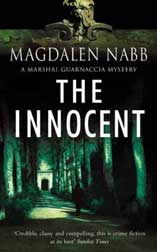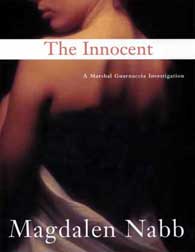 Q: What is the setting for the next Guarnaccia book?
Q: What is the setting for the next Guarnaccia book?
Nabb: Up to now, I’ve always used real sites but in the book I’m writing now (#13 The Innocent), I’ve cobbled together the site. For this book, I’ve decided to write about a little square which is not a square at all. It’s between the Pitti Palace and the via Maggio. It’s just a space created during war when the Germans blew up the bridges before retreating. They were told to blow up the Ponte Vecchio, but they didn’t want to. They had to blow up the access roads to it so the tanks couldn’t get through. They mined a number of houses on each side of the river. A junction on the left bank near the bridge was mined, opening up a space which now appears to be a square. It never had a name. There was a cheap little trattoria there, I Quattro Leoni, so everybody called the square Quattro Leoni. Before the war, the junction was known as something quite different. Men would say, “Let’s go to Le passere.” The word means the female sexual organ. And the reason for that is that there was a brothel on each corner. What happened a few years ago was, we lost our cheap little restaurant--it became a fancy place. So then in reaction to that, a party was held there and a street sign made and put up saying Piazza della Passera (see map). It looks like the real thing but no such address exists. It was an attempt to preserve something of the old Florence. I wanted to set a book in that little square that is not a square. I couldn’t, in the book, put it’s real name on it because nobody would understand it except Florentines so I left it nameless. I put in the fancy new restaurant but also an old fashioned cheap one facing it, modelled on one run by my friend, Andrea, which is really a few streets away. I wanted a limited canvas to work on and so put all the people and workshops of my story into one square. In the past that would occur naturally but the tiny, close-knit communities are being steadily eroded.
Q: Is tourism even taking over this neighborhood on the left side of the Arno?
Nabb: I feel very strongly that we are losing almost all of Florence to tourism--where we used to have those 1000 lire meals served by a family, we’ve now got hamburger bars.
It’s very depressing. That’s why Andrea, opened his cheap, old-fashioned trattoria, saying, “I want all the workmen to come and the artisans and the professors and the artists and the people who usually used to eat at I Quattro Leoni. And it’s going to be as cheap as it used to be and you come in and you sit where there’s a space, none of this business of waiting for a table to yourself. You eat what they have cooked and drink as much or as little as you want from the flask on your table.” He opened the place and it filled up immediately. In order to keep it cheap, it’s not officially a restaurant--it’s a club. You go in and fill out a form and pay a penny to join. That way, it’s not taxed like a restaurant. He opened it about three years ago. His wife does the cooking. A second, even tinier place has opened up. We want to reclaim our city.
Q: Is the new book going to deal with the loss of the wonderful places that are characteristic of Florence?
Nabb: Yes, and the artisans. Because this is the area of the artisans. There are almost no apprentices. And the apprentices they do get now are most often from Japan or England or wherever. It’s nice that they’ve got someone to give their skills to because their own children don’t want to work with their hands. So the book is about that. Someone gets caught in the machinery of that problem.
Q: Why is this happening?
Nabb: The feeling of the loss of tradition is very strong. We've had political problems in that there are no apprentices partly because it's been made politically impossible to have an apprentice. The apprentice used to pay the master to teach him a skill, which seems to be the right way around. But then it became--No, you have to pay them a wage--you have pay their contributions, as soon as they start work. The apprentice needs years and years of teaching before he can produce anything saleable, so the situation is impracticable. Another serious problem is that the EU laws have overridden the Florentine law forbidding the changing of the type of business carried on in a given shop. If, for example, a baker’s shop closed then only a new baker’s shop could open in its place. Now, it could be a shop selling postcards and trashy souvenirs, made in Taiwan, to tourists. This means the local people are not served and the sense of community is broken up. Rents are becoming absurdly high as globalized chains take over all the space. People feel very, very strongly about that. Some years ago, when they tried to open a hamburger bar in the Cathedral Square, the city revolted. A big protest party was held in the Cathedral Square, and the real restaurants in the area gave away free food, the whole evening. The people were not having this, right by the Baptistery.


